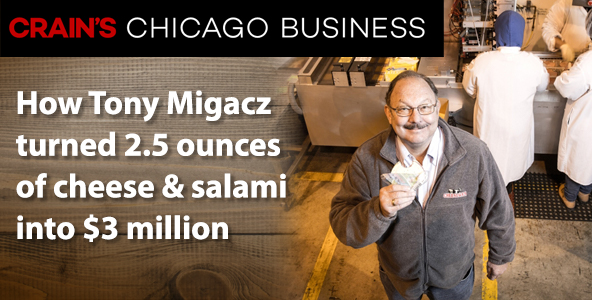Original article posted in Crain’s Chicago Business January 21, 2016 06:00 AM by Peter Frost
Tony Migacz had a simple idea: Sandwich a slice of hard salami between two slices of cheese. Seal it in easy-to-open plastic wrap. Strike retail gold.
Less than two years after launching his trademarked product, Cheesewich, Migacz has sold more than 3 million of the carbohydrate-free, protein-rich, though definitely not low-fat snacks to retailers across the country.
Available in vending machines and refrigerated sections of grocers and convenience stores typically for $1.99 apiece, Cheesewich pulled in about $3 million in revenue for Migacz’s company, Registry Steaks & Seafood, last year. Sales are on track to more than double in 2016, he says, as a major national retailer and at least one warehouse chain have verbal commitments to carry the product.
Migacz, 61, started selling steaks and seafood door to door in the Chicago area in the early 1980s and has since grown Lyons-based Registry to a $9 million-a-year business, distributing frozen steak, chicken, pork and seafood to homes in 50 states through independent salespeople.
He hatched the idea for Cheesewich a dozen years ago and patented the brand in 2005. But after struggling to find a partner in either the meatpacking or cheese industry, he opted to go it alone in late 2013. His Lyons warehouse had ample space for a packaging line, and all he needed to launch the brand were a few commercial meat and cheese slicers, a vacuum-sealing machine, packaging and branding materials, and a license from the U.S. Department of Agriculture.
His initial investment came to roughly $150,000. “It’s not that much,” he says. “But as a small-business guy, a single owner, those are big decisions to make.”
Nonetheless, Migacz thought he had a can’t-miss opportunity with Cheesewich, which hits on several prominent trends in the food industry: Each 2.5-ounce product is gluten-free, packs 14 to 16 grams of protein and is portable. “You just open it up and boom, you have a nice little snackeroni,” Migacz says. “On top of that, it’s a quality product. This is real cheese from Wisconsin and real salami.”
Convenience, a low price and the “crave factor”—fat accounts for three-quarters of a Cheesewich’s calories—are key to connecting with consumers at the point of purchase, says Darren Tristano, president of Chicago-based consumer research firm Technomic. “Although vending still struggles with healthier alternatives, consumer crave and indulgence drive the majority of consumer purchases,” he says.
Sales took off in late 2014 after appearances at the National Restaurant Show and the Sweets and Snacks Convention, and Migasz bought another vacuum-sealing machine, allowing him to package 80,000 units a week. He says he has interest from military installations, fishing and hunting lodges, and golf and ski resorts.
For now, he offers Cheesewich in four varieties, colby jack, pepper jack, provolone and mild cheddar, each encasing a slice of salami. He’s considering adding all-natural salami to the line, along with other cheeses, such as smoked provolone and mozzarella.
Sometimes the simplest ideas are the best.


